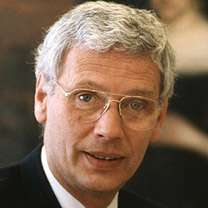Hans van den Broek
| His Excellency Hans van den Broek | |
|---|---|
 | |
| European Commissioner for External Relations and European Neighbourhood Policy | |
|
In office 6 January 1993 – 15 September 1999 | |
| President |
Jacques Delors (1993–1995) Jacques Santer (1995–1999) Manuel Marín (1999) |
| Preceded by | Frans Andriessen |
| Succeeded by | Leon Brittan |
| Minister of Foreign Affairs | |
|
In office 4 November 1982 – 3 January 1993 | |
| Prime Minister | Ruud Lubbers |
| Preceded by | Dries van Agt |
| Succeeded by | Peter Kooijmans |
| Personal details | |
| Born |
Henri van den Broek 11 December 1936 Paris, France |
| Political party |
KVP (pre 1980) CDA (from 1980) |
| Spouse(s) | Josée van Schendel |
| Children | 2 daughters |
| Alma mater | Utrecht University |
| Occupation | Lawyer |
| Religion | Roman Catholic |
Henri "Hans" van den Broek (Dutch pronunciation: [ɦɑ̃ːri ɦɑns vɑn dɛn bruk]; born 11 December 1936) is a former Dutch politician. He was Minister of Foreign Affairs (1982–1993) and European Commissioner for External Relations (1993–1999).
Early life and education
Henri van den Broek was born on 11 December 1936 in Paris in France. His father was Hendrik Johannes van den Broek and his mother was Maria Alberta Antonia Roest.[1]
Van den Broek went to the Roman Catholic secondary school Lyceum voor het Gooi in Hilversum. He studied Dutch law at Utrecht University in Utrecht, where he received his master's degree (Master of Law) in 1965.[1]
Career
Van den Broek began his career as a lawyer. He joined the Katholieke Volkspartij (KVP) and was member of the municipal council of Rheden between 1970 and 1974. Between 1976 and 1981 he was member of the House of Representatives, the lower house of the Dutch parliament, as representative of the KVP and later of the Christen-Democratisch Appèl (CDA).
He was Netherlands Minister for Foreign Affairs in the governments of Ruud Lubbers three times and in 1991 was one of the EU negotiators of the Brioni Agreement, which ended the ten-day war in Slovenia. On 6 January 1993 he became a member of the European Commission, once again with responsibility for foreign relations, especially the Enlargement of the European Union. He remained in that post until March 1999, when he retired from European politics.
On 25 February 2005, he was granted the honorary title of Minister of State.[1]
Van den Broek is president of the Netherlands Institute of International Relations (Clingendael) and also of Radio Netherlands. He is a Member of the Board of Advisors of the Global Panel Foundation, a respected NGO that works behind the scenes in crisis areas around the world.[2]
He is a signatory of Global Zero (campaign), a non-profit international initiative for the elimination of all nuclear weapons worldwide.[3]
Personal life
Van den Broek is married with Josee van den Broek-van Schendel. They have two daughters, one of whom is Princess Marilène, the wife of Prince Maurits of Orange-Nassau, van Vollenhoven.
Honours
- Grand Cross (GCMG) of the Order of St. Michael and St. George
- Grand Cross of the Order of Orange-Nassau (1993)[1]
- Minister of State (2005)[1]
| Government offices | ||
|---|---|---|
| Preceded by Dries van Agt |
Minister of Foreign Affairs 1982–1993 |
Succeeded by Peter Kooijmans |
| Preceded by Frans Andriessen |
Dutch European Commissioner 1993–2000 |
Succeeded by Frits Bolkestein |
References
- 1 2 3 4 5 "Mr. H. (Hans) van den Broek". www.parlement.com (in Dutch). Leiden University. Retrieved 8 September 2010. External link in
|work=(help) - ↑
- ↑ "Group Offers Plan to Eliminate Nukes by 2030" (PDF). The New York Times. 29 June 2009.
External links
| Wikimedia Commons has media related to Hans van den Broek. |

